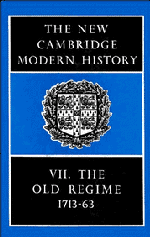Book contents
- Frontmatter
- CHAPTER I INTRODUCTORY SUMMARY
- CHAPTER II THE GROWTH OF OVERSEAS COMMERCE AND EUROPEAN MANUFACTURE
- CHAPTER III THE SOCIAL CLASSES AND THE FOUNDATIONS OF THE STATES
- CHAPTER IV THE VISUAL ARTS AND IMAGINATIVE LITERATURE
- CHAPTER V THE ENLIGHTENMENT
- CHAPTER VI RELIGION
- CHAPTER VII MONARCHY AND ADMINISTRATION
- CHAPTER VIII THE ARMED FORCES AND THE ART OF WAR
- CHAPTER IX INTERNATIONAL RELATIONS
- CHAPTER X THE DECLINE OF DIVINE-RIGHT MONARCHY IN FRANCE
- CHAPTER XI ENGLAND
- CHAPTER XII THE WESTERN MEDITERRANEAN AND ITALY
- CHAPTER XIII THE ORGANISATION AND RISE OF PRUSSIA
- CHAPTER XIV RUSSIA
- CHAPTER XV SCANDINAVIA AND THE BALTIC
- CHAPTER XVI POLAND UNDER THE SAXON KINGS
- CHAPTER XVII THE HABSBURG DOMINIONS
- CHAPTER XVIII THE WAR OF THE AUSTRIAN SUCCESSION
- CHAPTER XIX THE DIPLOMATIC REVOLUTION
- CHAPTER XX THE SEVEN YEARS WAR
- CHAPTER XXI THE DEVELOPMENT OF THE AMERICAN COMMUNITIES
- CHAPTER XXII RIVALRIES IN AMERICA
- CHAPTER XXIII RIVALRIES IN INDIA
- CHAPTER XXIV ECONOMIC RELATIONS IN AFRICA AND THE FAR EAST
- References
CHAPTER IX - INTERNATIONAL RELATIONS
Published online by Cambridge University Press: 28 March 2008
- Frontmatter
- CHAPTER I INTRODUCTORY SUMMARY
- CHAPTER II THE GROWTH OF OVERSEAS COMMERCE AND EUROPEAN MANUFACTURE
- CHAPTER III THE SOCIAL CLASSES AND THE FOUNDATIONS OF THE STATES
- CHAPTER IV THE VISUAL ARTS AND IMAGINATIVE LITERATURE
- CHAPTER V THE ENLIGHTENMENT
- CHAPTER VI RELIGION
- CHAPTER VII MONARCHY AND ADMINISTRATION
- CHAPTER VIII THE ARMED FORCES AND THE ART OF WAR
- CHAPTER IX INTERNATIONAL RELATIONS
- CHAPTER X THE DECLINE OF DIVINE-RIGHT MONARCHY IN FRANCE
- CHAPTER XI ENGLAND
- CHAPTER XII THE WESTERN MEDITERRANEAN AND ITALY
- CHAPTER XIII THE ORGANISATION AND RISE OF PRUSSIA
- CHAPTER XIV RUSSIA
- CHAPTER XV SCANDINAVIA AND THE BALTIC
- CHAPTER XVI POLAND UNDER THE SAXON KINGS
- CHAPTER XVII THE HABSBURG DOMINIONS
- CHAPTER XVIII THE WAR OF THE AUSTRIAN SUCCESSION
- CHAPTER XIX THE DIPLOMATIC REVOLUTION
- CHAPTER XX THE SEVEN YEARS WAR
- CHAPTER XXI THE DEVELOPMENT OF THE AMERICAN COMMUNITIES
- CHAPTER XXII RIVALRIES IN AMERICA
- CHAPTER XXIII RIVALRIES IN INDIA
- CHAPTER XXIV ECONOMIC RELATIONS IN AFRICA AND THE FAR EAST
- References
Summary
In 1713 and 1714 eleven separate treaties of peace almost brought the War of the Spanish Succession to an end. They left the Emperor and the king of Spain still at war, but large-scale hostilities were over and most of the belligerents had been able to reach a satisfactory settlement. The Spanish possessions were divided. Philip V, the grandson of Louis XIV, was recognised as king of Spain in spite of the disapproval of the Protestant Powers and of the Emperor; but he had to resign his claims to the throne of France, and he was not allowed to inherit the empire of Charles II in its entirety. Philip V received Spain and Spanish America, but the Netherlands, Milan, Naples, Mantua, Sardinia and the Spanish ports in Tuscany went to the Emperor Charles VI. Sicily went for a few years to the duke of Savoy.
In addition many other problems besides the division of the territories of the Spanish Habsburgs were settled by the peace treaties of 1713–14. In the treaty concluded between England and France the claim of the Hanoverians to the throne of England was also recognised. Implicitly this gave recognition to the theory of civil contract, and this concept was given further validity by the provisions that the arrangements for the successions to the thrones of France and of Spain were to be officially registered by the Parlement and by the Cortes respectively. The French diplomats warned their English colleagues that such an attempt to regulate the succession was not valid in French law; that the right to rule was derived from God, and that, should the death of the infant French prince leave the throne vacant, Philip V could not be bound by his renunciation but must mount the throne to which God had called him; but they did, at last, accept the provisions in public law which professed to regulate the succession by man-made agreements.
- Type
- Chapter
- Information
- The New Cambridge Modern History , pp. 191 - 213Publisher: Cambridge University PressPrint publication year: 1957
References
- 1
- Cited by



